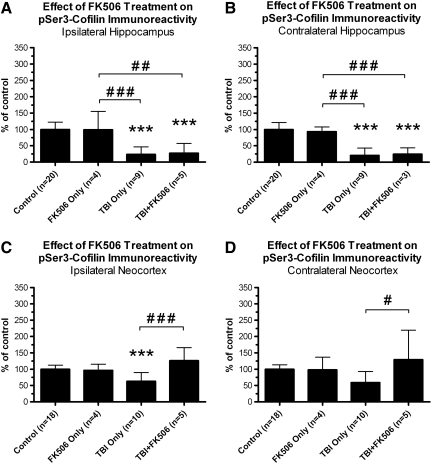FIG. 7.
A 1-h post-traumatic brain injury (TBI) administration of FK-506 prevented the 24 h post-TBI loss of pSer3-cofilin immunoreactivity in the neocortex but not in the hippocampus. Adult rats received either lateral fluid percussion TBI alone (TBI only,), TBI followed by a 1-h post-TBI injection of FK-506 (5 mg/kg IP; TBI+FK-506), FK-506 injection but no TBI (FK-506 only), or no treatment (control). All groups were sacrificed at 24 h post-TBI (or 23 h post-injection), along with equivalently-aged control rats. The ipsilateral and contralateral hemispheres of the hippocampus and neocortex were dissected, separately homogenized, and subjected to immunoblotting with antibodies recognizing the serine 3-phosphorylated cofilin (pSer3-cofilin). Statistical analysis identified region-specific effects of FK-506 treatment on pSer3-cofilin phosphorylation. For example, FK-506 treatment did not prevent the loss of pSer3-cofilin at 24 h post-TBI, in either the ipsilateral hippocampus (A) or contralateral hippocampus (B). In the neocortex, however, FK-506 treatment completely blocked the loss of pSer3-cofilin at 24 h post-TBI in both the ipsilateral (C) and contralateral (D) hemispheres. All comparisons were made by one-way analysis of variance with Tukey's post-hoc test (***p<0.001 versus controls; #p<0.05 versus the other bracketed group; ##p<0.01 versus the other bracketed group; ###p<0.001 versus the other bracketed group).

